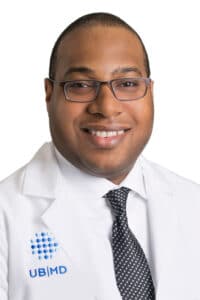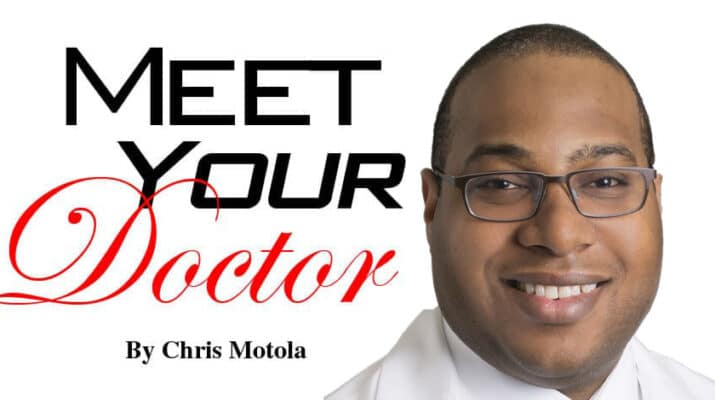For UBMD Family Medicine doctor, preventive care and education are key to good health
By Chris Motola

Q: What are the obstacles to administering preventive care to underserved populations?
A: Typically, when the general public thinks about seeing their doctor, it’s when they’re not feeling well which is, of course, appropriate. But a huge part of staying healthy is preventive care and making sure everyone is able to live their best lives. So from that standpoint, because it’s not top-of-the-line for everyone, a lot of what we do is try to educate our patient population about the benefits of preventive care. Preventive care is a bedrock of what we do, so being able to promote and practice whenever we can. Even dovetailing it into visits when a patient comes in for acute care. We want to be able to follow our patients and have that kind of continuity of care.
Q: In practice, what does preventive care look like?
A: In family medicine we have the great privilege of being able to follow people from birth through the twilight years. Preventive care changes and evolves over that timeline. Generally speaking, preventive care consists of making sure immunizations are up to date, making sure you have appropriate cancer screenings and encouraging healthy lifestyles and being able to preempt any issues that may arise.
Q: How do you work around insurance issues, transportation issues — things that prevent people from showing up in your office in the first place, especially when they’re not feeling well?
A: I think that, for any primary care physician, that is a huge challenge and barrier. I think, overall, medicine and society are becoming aware of the social determinants of health, and how they’re just as important. That can include issues like maintaining transportation, insurance coverage and cost. Our practice is very fortunate to have a strong partnership with Erie County Medical Center [ECMC] and have our family clinic location on ECMC grounds. That partnership allows us access to wonderful case managers and social workers who work tirelessly to be able to make sure that we can leverage the resources that are available at the local and state level.
Q: What does your patient populace look like?
A: Since our practice is on the ECMC grounds in the heart of Buffalo, we are looking at an area that can be very medically underserved. We get patients from a wide variety of backgrounds, but we serve a great number of patients who are on Medicare or Medicaid and who are on the lower end of the socio-economic ladder. We all enjoy being able to serve that community and make them be healthier and [able to] make better decisions about their health. In terms of the issues we see, we see a lot of chronic diseases, namely high blood pressure, diabetes, chronic kidney disease. These are all longstanding issues we see in our patient population.
Q: What’s your approach to trying to convince patients to make changes to their life?
A: It’s not always easy. I think the buy-in from patients can vary, but one of the greatest things I feel that I can offer to a patient is my time. So being able to sit with them, talk with them, really hear their concerns can really make a difference.
Q: Do you find it’s easier to build these relationships in family medicine than many specialties?
A: One of the beauties of family medicine is that we have the privilege of having a long-term conversation with our patients. And so I really think being able to listen and have that conversation and why any particular intervention is important is key to that process. I also think medicine is moving from a more paternalistic level toward a shared decision-making process where the patient is much more engaged in their healthcare and feels they are able to not only access the care they need, but engage in terms of questions and decision-making. So many times, with regards to preventive care, as much as we make our medical judgments, shared decision-making comes into play. Hopefully patients feel much more in control of their healthcare.
Q: With regards to COVID-19 and preventive care, there’s been a lot of politicization over preventive measures. Do you find your patients are receptive overall?
A: I do. I think our patients definitely take the pandemic very seriously. I think everyone that I’ve met has been, as far as I can see, trying to socially distance and show sensitivity toward the elderly population. It’s good to see that the message is being understood loud and clear, and that there’s buy-in.
Lifelines
Name: Patrick D. Glasgow, M.D.
Position: Attending physician and clinical assistant professor of family medicine at University at Buffalo
Past employment: Clinical instructor, family medicine, University at Buffalo (2016–2017); family physician, Appletree Medical Group based in Ottawa and Toronto (2015–2016)
Hometown: Toronto, Ontario
Education: Ross University School of Medicine
Affiliations: Erie County Medical Center
Organizations: American Academy of Family Physicians; North American Primary Care Research Group; Society of Teachers of Family Medicine
Awards and honors: SUNY UB Chairman‘s Award for Scholarship in Residency (2013); Ambassador of Switzerland Prize in French (2003); Duke of Edinburgh Gold Award (1998)
Philosophy: ‘I am committed to providing quality medical care to a wide cross section of patients of all ages, with a special focus on preventive care. A unifying theme of my care is patient education and the prevention of disease, and I am dedicated to empowering patients through education and giving them the tools to make informed decisions about their medical care’
Family: Wife (Catherine); Children (Christina and Ethan)
Hobbies: Music appreciation (jazz, classical, alternative)

